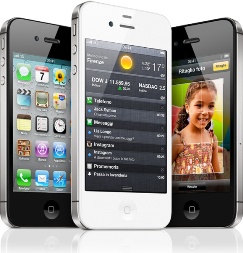
In accordo a una recentissima survey, che il provider californiano di servizi per la telefonia mobile in ambito business iPass ha condotto con l'ausilio di circa 2.300 lavoratori, il BlackBerry di Research In Motion (RIM) non è più lo smartphone più utilizzato nelle aziende, poichè esso ha subito il sorpasso da parte dell'iPhone di Apple. Inoltre, un altro dato di rilievo che emerge dalla survey di iPass è la vertiginosa crescita, questa volta nel comparto business, della piattaforma Android di Google.
Più in dettaglio i dati raccolti da iPass permetto di collocare l'iPhone al primo posto tra gli smartphone aziendali con uno share del 45%: la crescita della device di Apple anno su anno è considerevole, dal momento che lo scorso anno la sua quota ammontava al 31.1%. Lo share del BlackBerry è invece in calo, essendo passato dal 34.5% dello scorso anno al 32.2% di oggi, mentre non può passare inosservato il trend positivo di Android, forte ora di un terzo posto con il 21.3% di share, ben lontano dalla quota di 11.3 punti percentuali registrata lo scorso anno.
iPass ha anche sottolineato che la diminuzione dell'utilizzo del BlackBerry deve essere interpretata come il risultato della crescita dei competitor, piuttosto che come il frutto di una crisi intrinseca che ora caratterizza il gadget di RIM; inoltre, Android sta evidentemente rubando fette notevoli di mercato al binomio Nokia/Symbian.
Infine, secondo iPass il numero di lavoratori che utilizza un tablet nel terzo timestre del 2011 è risultato essere pari al 44%, mentre il valore corrispondente in relazione al secondo trimestre del 2011 è pari al 33%.
Apple iPhone 4S

[Immagine ad alta risoluzione]

iPass Inc. (NASDAQ: IPAS), a leading provider of mobility services for enterprises and service providers, today published its quarterly Mobile Workforce Report, which found that iPhone has unseated BlackBerry as the top smartphone among mobile employees with 45 percent market share, and overall business smartphone usage has increased to 91 percent.
The findings come as mobility in the workforce expands within enterprises and business smartphone usage rises. Today 95 percent of mobile employees have smartphones, up from 85 percent in 2010, with 91 percent using their smartphone for work – a 26 percent rise compared to 2010. This is due in part to the adoption of "bring your own device" policies by enterprises. Currently 42 percent of mobile employees use individually-liable smartphones for work, up from 34 percent last year. The report also found that this expansion within enterprises has also reduced the median age of a mobile employee to 41 – indicating that mobile employees are no longer only business travelers; they are every knowledge worker with a smartphone.
"Today’s mobile employees are critical to the success of every enterprise, contributing 240 more work hours a year than their non-mobile counterparts. Connectivity is essential because work is no longer where you go but what you do," said Evan Kaplan, president and CEO of iPass. "While increasing iPhone usage in the workplace was inevitable, this is the tipping point when the iPhone has overcome the Blackberry on its traditional enterprise turf, and business smartphones are in the hands of nearly every knowledge worker."
Smartphone Attachment
The Mobile Workforce Report also found the saturation of mobile devices has led to a hyperconnected workforce that is sacrificing sleep and exercise for their jobs. One in three mobile employees claimed that they sleep less due to work and one in four mobile employees sleeps less than six hours a night. More than half reported that they exercise erratically or not at all — 60 percent attributed lack of exercise to work. The report also found that mobile employees are emotionally attached to their smartphones – 59 percent would feel disoriented, distraught or lonely if they were without a smartphone for even a week.
Other findings include:
- Mobile employees waste only about 28 minutes on technology distractions. The top two most time consuming technology distractions are work-related – first work email, second technical issues and third social media.
- BlackBerry market share declined slightly from 35 percent in 2010 to 32 percent today, while Android nearly doubled market share year over year, growing into the number three spot (surpassing Nokia/Symbian) with 21 percent market share.
- Tablet ownership has grown to 44 percent of mobile employees, up from 33 percent in second quarter of 2011.
- Mobile employees describe themselves as highly proficient when it comes to technology (69 percent), compared to 6 percent who rated themselves as fairly proficient or non-proficient. As a result the majority of mobile employees only contact IT as a last resort (81 percent).
Source: iPass Press Release
Links



